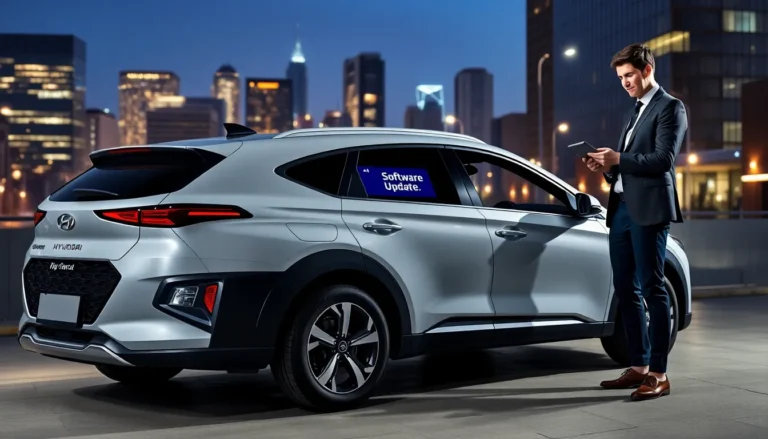Table of Contents
ToggleAs the world spins into a new era of work, Gen Z is stepping onto the scene with fresh ideas and a unique approach. Gone are the days of clocking in and out like robots. This generation thrives on flexibility, creativity, and a sprinkle of fun, turning the traditional workplace upside down.
Imagine a work environment where collaboration happens over TikTok dances and brainstorming sessions include coffee breaks that double as wellness check-ins. It’s not just a fantasy; it’s the reality Gen Z is crafting. They’re redefining success, prioritizing mental health, and demanding purpose over paychecks. Buckle up as we dive into the quirks and trends that are shaping the future of work, all while keeping a smile on our faces.
Overview of Gen Z Work Trends
Generation Z significantly influences workplace dynamics. This cohort values flexibility and creativity, shaping new expectations for employers. They seek out environments that foster collaboration, often incorporating elements like social media activities to enhance team bonding.
Mental health stands at the forefront of their priorities. Many individuals from Gen Z emphasize the importance of well-being over traditional metrics of success. They pursue roles that offer purpose, aligning personal values with professional responsibilities.
Statistical insights reveal that 70% of Gen Z employees prefer jobs with flexible work arrangements. This trend reflects their desire for a better work-life balance, emphasizing the need for remote work options and flexible hours. Companies recognizing these preferences are more likely to attract and retain talent from this generation.
Communication styles differ as well. Gen Z favors direct, transparent discussions over formal meetings. They appreciate feedback delivered in real-time, promoting a culture of continuous improvement.
Diversity and inclusivity also influence their work preferences. Members of Gen Z actively seek employers committed to social issues and diverse workplace cultures. Research shows that 67% of Gen Z workers prioritize advocacy for social justice in their choice of employer.
These evolving trends signal a shift in workplace culture, encouraging organizations to adapt to meet these new expectations. Traditional models may no longer suffice as Gen Z asserts its influence over workplace design and policies. The future of work promises to be more vibrant and inclusive as employers adjust to this generation’s needs and values.
Key Characteristics of Gen Z


Gen Z brings distinct characteristics to the workplace, shaping new dynamics with their preferences and behaviors.
Digital Natives
Digital natives fully embrace technology. They’ve grown up with smartphones and social media, using these tools for communication and collaboration. A staggering 70% of Gen Z enjoys flexible work arrangements, which often include remote or hybrid options. This generation thrives on instant access to information and utilizes various digital platforms for productivity. They expect employers to provide tech-savvy environments conducive to their style. Their comfort with digital tools enhances teamwork and innovation in the workplace, creating a culture where ideas flow freely.
Value-Driven Work Ethic
A strong value-driven work ethic defines Gen Z. They prioritize mental health, purpose, and job satisfaction over financial gain. Research shows that 67% of Gen Z seeks employers committed to social justice and diversity. This generation values authenticity and transparency in workplace communications, favoring real-time feedback over formal reviews. Personal fulfillment drives their productivity, encouraging organizations to align with their ideals. Gen Z’s strong emphasis on ethics and inclusivity significantly influences workplace culture, pushing companies to adopt more progressive policies.
Preferred Work Environments
Generation Z thrives in work environments that foster flexibility and creativity. They seek setups that cater to their unique lifestyles and preferences.
Remote Work Preferences
Remote work appeals particularly to Gen Z employees, with 70% opting for flexible arrangements to enhance their work-life balance. Comfort and productivity often occur in personalized home environments, allowing for tailored work conditions. Many in this generation value the freedom to choose their workspace, whether it’s a cozy café or a dedicated home office. Communication frequently occurs through digital platforms, emphasizing real-time feedback rather than in-person meetings. The emphasis on autonomy leads to increased job satisfaction, as individuals maintain control over their schedules and environments.
Collaborative Spaces
Collaborative spaces resonate with the innovative spirit of Gen Z. Open layouts and inviting designs encourage team synergy and creativity. These young professionals thrive on brainstorming sessions and collective problem-solving, finding inspiration in shared environments. Comfortable lounges and flexible workstations appeal to their desire for both focus and interaction. Employers who foster these spaces see improved engagement and productivity among their teams. According to studies, 67% of Gen Z employees value inclusivity, further driving the need for diverse collaborative settings that reflect various perspectives and cultures.
Communication Styles
Generation Z values direct communication in the workplace, embracing an open dialogue approach. Their preference for transparency shapes the way teams operate and interact.
Emphasis on Transparency
Transparency remains a priority for Gen Z. They thrive in environments where honesty is encouraged, leading to enhanced trust and collaboration. Around 75% of Gen Z employees favor workplaces that provide regular feedback, ensuring they feel informed and engaged. This generation resists ambiguity, seeking clarity in expectations and outcomes. Clear communication fosters strong relationships among colleagues and supports effective teamwork.
Use of Technology
Technology plays a central role in how Gen Z communicates. This generation utilizes digital platforms for instant messaging and virtual meetings, streamlining collaboration. Nearly 80% of Gen Z workers feel more comfortable communicating via technology compared to traditional face-to-face interactions. Familiarity with innovative tools allows them to connect effortlessly, share ideas, and collaborate on projects. Their adaptiveness to emerging technologies creates a dynamic and interactive workplace culture.
Career Expectations
Generation Z has distinct expectations when it comes to their careers, driven by their unique values and experiences.
Work-Life Balance
Flexibility stands at the forefront of Gen Z’s career expectations. Seventy percent of this generation prefers jobs that offer flexible work arrangements. Such arrangements provide the necessary balance between personal life and professional duties. Many Gen Z employees thrive in environments that allow remote work, which enhances comfort and productivity. Mental health emerges as a significant priority, making it essential for employers to support these needs. Collaborative break times and wellness activities contribute to an engaging workplace. These settings resonate well with Gen Z’s desire for enjoyable work experiences while fostering job satisfaction.
Opportunities for Growth
Opportunities for growth capture the attention of Gen Z workers. This generation actively seeks positions that promote continuous learning and skill enhancement. About 75% of Gen Z employees appreciate regular feedback, indicating their commitment to personal and professional development. Mentorship programs and training initiatives appeal greatly, aligning with their ambition to evolve within their roles. Employers fostering a culture of innovation and education see greater engagement from this cohort. Career paths that clearly outline advancement potential attract Gen Z talent by demonstrating a commitment to development and success.




